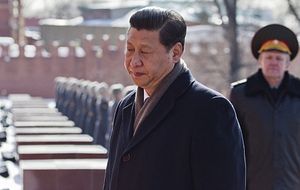For the past four months, the media has been obsessed with the idea of a new “Gang of Four” in Chinese politics. It is popularly believed that Zhou Yongkang, Ling Jihua, Xu Caihou, and Bo Xilai formed a political faction and conspired to overthrow the Xi Jinping leadership through a coup.
Apparently, cues from China’s official media have lent some support to this conspiracy theory. First, when Zhou Yongkang was expelled from the Party on December 5, 2014, it was reported that he had seriously violated the Party’s “political discipline, organizational discipline, and confidential discipline.”
Second, one week after Ling Jihua was investigated for “serious violations of the Party discipline,” the Politburo held a meeting against factionalism on December 29, 2014. It was pointed out at the meeting that “banding together in gangs, forming cliques for private ends, or forming factions is not permitted,” hinting that Ling had been involved in factional activities.
Third, in an article published on China Disciplinary Inspection and Supervision Daily on March 18, 2015, Zhou Qiang, party group secretary and president of the Supreme People’s Court of the People’s Republic of China, shared what he had learned from General Secretary Xi Jinping. Most interestingly, Zhou mentioned that Zhou Yongkang and Bo Xilai had “trampled on rule of law, wrecked party unity, and engaged in non-organizational political activities.”
Nevertheless, the evidence is still too thin to glue the four men together as a “Gang of Four.” For one thing, there is no evidence of Xu Caihou’s involvement in “non-organizational political activities” either alone or together with Zhou, Ling, and Bo. Xu’s problem was taking bribes, not participating in a coup.
Meanwhile, Ling’s involvement in factional activities may have nothing to do with Zhou and Bo. There is no evidence that either Zhou or Bo (much less both) were part of Ling’s inner circle, Xishan Hui, which is composed of government officials and business people from Shanxi.
For that matter, there is no hard evidence that Zhou and Bo conspired to overthrow Xi. It is likely that Zhou had thought highly of Bo before the Wang Lijun Incident and Zhou might have privately communicated with Bo about the handling of that scandal. But it is hard to imagine that Zhou would have pledged his support for Bo two years after his retirement.
Finally, there is no evidence that the four men ever held any private meeting together on any topic. The only time they were physically in the same location (along with thousands of others) was during the official occasions of the National People’s Congress sessions, as they were deputies to the NPC during the same period.
In a word, it is interesting and convenient to use the term “new Gang of Four” but it is far from clear that the four were ever involved together in any “non-organizational political activities.”

































